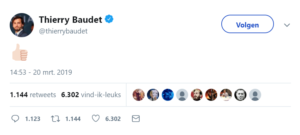What role did the media play in the run-up to the Dutch provincial and Senate elections of 20 March? These were won by the far-right populist Forum for Democracy and its leader Thierry Baudet. Shouldn’t the media have fact-checked, corrected and brought to attention the danger that the party and its leader present? This is the question Windesheim student of journalism Milou Ros dives into after her factcheck of a statement by Baudet, that proved to be false.
On Wednesday the 20th of March, Dutch political party Forum for Democracy, led by far-right populist Thierry Baudet, scored a major victory: it won the largest number of votes throughout the Netherlands, and will take 13 of the 75 seats in the Dutch Senate in May. While the rise of Thierry Baudet may have come as a surprise to some, it actually isn’t much of a surprise at all. There are many factors that played a part in Baudet’s political success, but the one that may be the most interesting to look at is the part that the media played during the elections.
When we look at the USA, we wonder how Trump could have become president and how the country could have let that happen, but when we look at our own rising far-right populist party, we do not know how to deal with it ourselves.
On the one hand, the way mostly leftist Dutch talk shows like De Wereld Draait Door (‘As The World Turns’) spoke about Forum for Democracy and its following, may have caused an increase in votes. One day before the election, leftist speakers, one even more outspoken than the other, spoke about the political party for about half an hour during a broadcast of DWDD. They called Baudet an idiot and made fun of the political party and its following. When looking on Twitter, Forum’s following reacted the way columnist Özcan Akyol predicted: they became even more motivated to vote for the political party. By mocking Baudet and his following on live television, the people at home felt looked down upon. To them, this was (again) a confirmation that Baudet’s statements about the existing ‘media cartel’ are true.
Fear for partisanship
On the other hand, Baudet and Forum for Democracy have repeatedly been given a platform to share their opinions and statements. They campaigned against open borders politics and against what Baudet calls ‘climate-change hysteria’. Out of fear for partisanship, the media barely called Baudet’s propaganda by what it is: propaganda. They did not try to reveal the truth enough. Maybe even worse: some think widely shared views should be openly discussed and shared, even when their statements are proven to be false. This under the guise of freedom of speech for all. The amount of attention Forum’s statements and opinions received, may have helped them spread their words throughout the country.
When we look at other countries that elect and choose so-called fascist leaders, the Dutch media are aware of the dangers and are ready to jump right into critical analysis. But when it comes to Baudet, they forget to pay critical attention to the danger happening in their own country. Shouldn’t the media have been there to fact-check, correct and bring attention to the danger that Forum for Democracy presents? Shouldn’t the media have put more energy in enlightening the voters by writing and speaking about it in a way that’s both critical and inclusive? For example, inviting both leftist and rightist speakers to talk about a political party could possibly lead to a better, more informative discussion. While some journalists and media platforms were openly raging against Forum for Democracy, others were too afraid to even be critical at all. We should find a balance between the both. Maybe we can learn something from this. Let’s hope we do.
Leave your comments, thoughts and suggestions in the box below. Take note: your response is moderated.
RESEARCH | ARTICLE © Milou Ros, Windesheim University of Applied Sciences, NL








